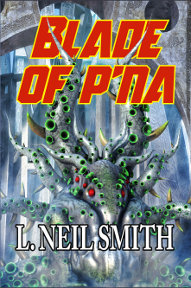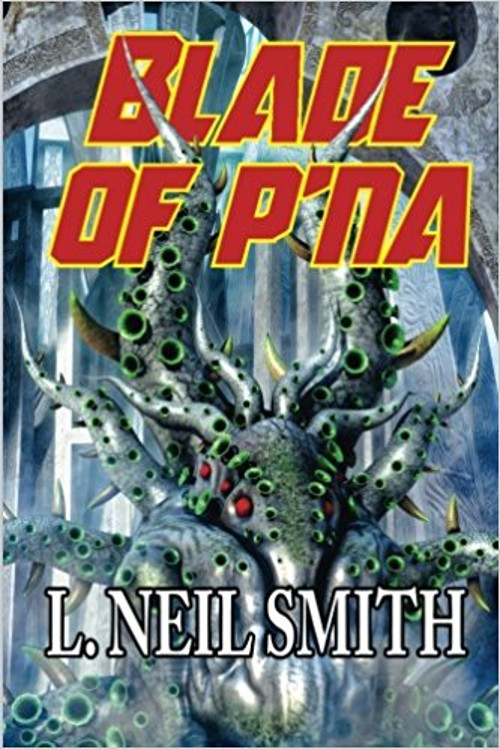Review of L. Neil Smith’s Blade of p’Na
by John Walker
[email protected]
Special to L. Neil Smith’s The Libertarian Enterprise
This novel is set in the “Elders” universe, originally introduced in the 1990 novels Contact and Commune and Converse and Conflict, and now collected in an omnibus edition with additional material, Forge of the Elders. Around four hundred million years ago the Elders, giant mollusc-like aquatic creatures with shells the size of automobiles, conquered aging, and since then none has died except due to accident or violence. And precious few have succumbed to those causes: accident because the big squid are famously risk averse, and violence because, after a societal adolescence in which they tried and rejected many political and economic bad ideas, they settled on p’Na as the central doctrine of their civilisation: the principle that nobody has the right to initiate physical force against anybody else for any reason—much like the Principle of Non-Aggression, don’t you know.
On those rare occasions order is disturbed, the services of a p’Nan “debt assessor” are required. Trained in the philosophy of p’Na, martial arts, psychology, and burnished through a long apprenticeship, assessors are called in either after an event in which force has been initiated or by those contemplating a course which might step over the line. The assessor has sole discretion in determining culpability, the form and magnitude of restitution due, and when no other restitution is possible, enforcing the ultimate penalty on the guilty. The assessor’s sword, the Blade of p’Na, is not just a badge of office but the means of restitution in such cases.
The Elders live on one of a multitude, possibly infinite, parallel Earths in a multiverse where each planet’s history has diverged due to contingent events in its past. Some millennia after adopting p’Na, they discovered the means of observing, then moving among these different universes and their variant Earths. Some millennia after achieving biological immortality and peace through p’Na, their curiosity and desire for novelty prompted them to begin collecting beings from across the multiverse. Some were rescues of endangered species, while others would be more accurately described as abductions. They referred to this with the euphemism of “appropriation”, as if that made any difference. The new arrivals: insectoid, aquatic, reptilian, mammalian, avian, and even sentient plants, mostly seemed happy in their new world, where the Elders managed to create the most diverse and peaceful society known in the universe.
This went on for a million years or so until, just like the revulsion against slavery in the 19th century in our timeline, somesquid happened to notice that the practice violated the fundamental principle of their society. Appropriations immediately ceased, debt assessors were called in, and before long all of the Elders implicated in appropriation committed suicide (some with a little help). But that left the question of restitution to the appropriated. Dumping them back into their original universes, often war-torn, barbarous, primitive, or with hostile and unstable environments after up to a million years of peace and prosperity on the Elders’ planet didn’t make the ethical cut. They settled on granting full citizenship to all the appropriated, providing them the gift of biological immortality, cortical implants to upgrade the less sentient to full intelligence, and one more thing…. The Elders had developed an unusual property: the tips of their tentacles could be detached and sent on errands on behalf of their parent bodies. While not fully sentient, the tentacles could, by communicating via cortical implants, do all kinds of useful work and allow the Elders to be in multiple places at once (recall that the Elders, like terrestrial squid, have ten tentacles—if they had twelve, they’d call them twelvicles, wouldn’t they?). So for each of the appropriated species, the Elders chose an appropriate symbiote who, upgraded in intelligence and self-awareness and coupled to the host by their own implant, provided a similar benefit to them. For humanoids, it was dogs, or their species’ canids.
(You might think that all of this constitutes spoilers, but it’s just the background for the Elders’ universe which is laid out in the first few chapters for the benefit of readers who haven’t read the earlier books in the series.)
Hundreds of millions of years after the Great Restitution Eichra Oren (those of his humanoid species always use both names) is a p’Na debt assessor. His symbiote, Oasam Otusam, a super-intelligent, indiscriminately libidinous, and wisecracking dog, prefers to go by “Sam”. So peaceful is the planet of the Elders that most of the cases Eichra Oren is called upon to resolve are routine and mundane, such as the current client, an arachnid about the size of a dinner table, seeking help in tracking down her fiancé, who has vanished three days before the wedding. This raises some ethical issues because, among their kind, traditionally “Saying ‘I do’ is the same as saying ‘bon appétit’?”. Many, among sapient spiders, have abandoned the Old Ways, but some haven’t. After discussion, in which Sam says, “You realize that in the end, she’s going to eat him”, they decide, nonetheless, to take the case.
The caseload quickly grows as the assessor is retained by investors in a project led by an Elder named Misterthoggosh, whose fortune comes from importing reality TV from other universes (there is no multiverse copyright convention—the p’Na is cool with cultural appropriation) and distributing it to the multitude of species on the Elders’ world. He (little is known of the Elders’ biology…some say the females are non-sentient and vestigial) is now embarking on a new project, and the backers want a determination by an assessor that it will not violate p’Na, for which they would be jointly and separately responsible. The lead investor is a star-nosed mole obsessed by golf.
Things become even more complicated after a mysterious attack which appears to have been perpetrated by the “greys”, creatures who inhabit the mythology and nightmares of a million sapient species, and the suspicion and fear that somewhere else in the multiverse, another species has developed the technology of opening gates between universes, something so far achieved only by the now-benign Elders, with wicked intent by the newcomers.
What follows is a romp filled with interesting questions. Should you order the vegan plate in a restaurant run by intelligent plants? What are the ethical responsibilities of a cyber-assassin who is conscious yet incapable of refusing orders to kill? What is a giant squid’s idea of a pleasure yacht? If two young spiders are amorously attracted, it only pupæ love? The climax forces the characters to confront the question of the extent to which beings which are part of a hive mind are responsible for the actions of the collective.
L. Neil Smith’s books have sometimes been criticised for being preachy libertarian tracts with a garnish of science fiction. I’ve never found them to be such, but you certainly can’t accuse this one of that. It’s set in a world governed for æons by the principle of non-aggression, but that foundation of civil society works so well that it takes an invasion from another universe to create the conflict which is central to the plot. Readers are treated to the rich and sometime zany imagination of a world inhabited by almost all imaginable species where the only tensions among them are due to atavistic instincts such as those of dogs toward tall plants, combined with the humour, ranging from broad to wry, of our canine narrator, Sam.

From Amazon.com in: Kindle or
Paperback.
Smith, L. Neil
Blade of p’Na
Rockville, MD: Phoenix Pick, 2017
ISBN 978-1-61242-218-3.
Reprinted from
Fourmilog:
None Dare Call It Reason John Walker’s Fourmilab Change Log
This is in the public domain; you’re free to link and/or republish as you wi
Was that worth reading?
Then why not:
![]()
AFFILIATE/ADVERTISEMENT
This site may receive compensation if a product is purchased
through one of our partner or affiliate referral links. You
already know that, of course, but this is part of the FTC Disclosure
Policy
found here. (Warning: this is a 2,359,896-byte 53-page PDF file!)

